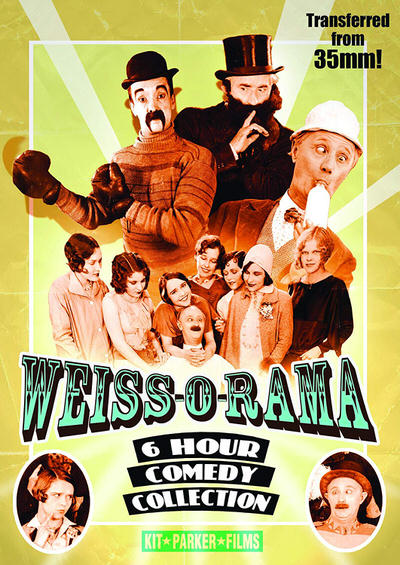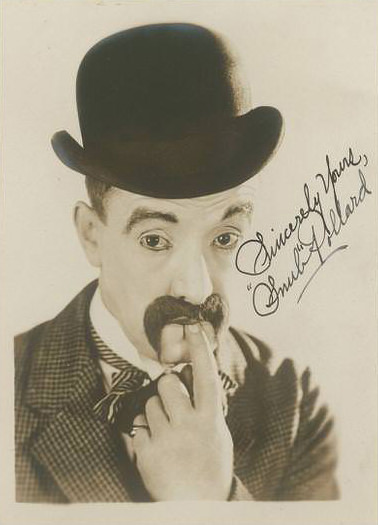Late Period Comedies of Turpin and Pollard
In 2004, Kit Parker, a longtime distributor and rescuer of so-called orphan films (usually film prints with expired — or no — copyrights), purchased the 35mm negatives of the Weiss Brothers. The Weiss family immigrated to the U.S. from Hungary in 1883. Brothers Adolph, Max and Louis first owned movie theaters, but entered film production in 1915 and made nearly 25 years of feature films, serials and short subjects.
Among the Weiss Brothers’ many pursuits was giving “lesser” comedians their own shorts vehicles in the waning days of silent film. Kit Parker’s Weiss-O-Rama two DVD set features several of them, including the perpetually cross-eyed Ben Turpin.  Turpin first worked at Essanay Studios, staring in 1907. In fact, he’s credited with receiving the first silent comedy pie in the face in 1909’s Mr. Flip. After performing with Charlie Chaplin at Essanay, Turpin made films with Vogue, a little-known comedy company, and later joined the Mack Sennett studio, where he had his greatest success, usually doing spoofs and parodies of famous feature films. The Weiss Brothers was Turpin’s last stop before the sound era. Their films had lower budgets than Sennett’s and none of the comedians who worked for them made any masterpieces. There are, though, some funny bits and business to be enjoyed.
Turpin first worked at Essanay Studios, staring in 1907. In fact, he’s credited with receiving the first silent comedy pie in the face in 1909’s Mr. Flip. After performing with Charlie Chaplin at Essanay, Turpin made films with Vogue, a little-known comedy company, and later joined the Mack Sennett studio, where he had his greatest success, usually doing spoofs and parodies of famous feature films. The Weiss Brothers was Turpin’s last stop before the sound era. Their films had lower budgets than Sennett’s and none of the comedians who worked for them made any masterpieces. There are, though, some funny bits and business to be enjoyed.
In The Cockeyed Family (1928), Turpin’s sons are evil little pranksters, sawing a leg off a living room chair, sticking a goldfish down into their underpants (the youngest is played by midget Billy Barty). Title card: “The children weren’t spoiled — the whole family smelled that way”. On a long car trip to accept a new job, Turpin is forced to share a camping bed with Billy, and wakes up to Billy’s bare butt inches from his face, with Billy maliciously smiling! Yes, this is low comedy, not far from an Adam Sandler movie; there’s nothing new under the sun.
My impression is that Turpin’s Weiss films were only as funny as the writing. At times he could be hilarious. In Holding His Own (1928), Ben Muggs and his wife keep getting into compromising positions at a high class party as she clumsily attempts to disentangle his falling-apart tux by climbing on top of him and diving into his jacket: “I’m learning to be an osteopath — I was just giving Ben a treatment.” The short ends with some impressive physical comedy and a grand pie fight.
 Born in 1889, Australian “Snub” Pollard first performed in an opera company. He began appearing in silent comedies as early as 1915 and had a long career, with Bebe Daniels, playing supporting roles in Harold Lloyd shorts. For the Weiss films, Pollard was sometimes teamed with Marvin Loback as a sort of second-run Laurel and Hardy duo. The Weiss/Pollard films are watchable, but rarely funny or inspired. Pollard isn’t helped by the fake and, frankly, ugly upside-down Kaiser Wilhelm mustache he sports; it looks dated and a bit sad.
Born in 1889, Australian “Snub” Pollard first performed in an opera company. He began appearing in silent comedies as early as 1915 and had a long career, with Bebe Daniels, playing supporting roles in Harold Lloyd shorts. For the Weiss films, Pollard was sometimes teamed with Marvin Loback as a sort of second-run Laurel and Hardy duo. The Weiss/Pollard films are watchable, but rarely funny or inspired. Pollard isn’t helped by the fake and, frankly, ugly upside-down Kaiser Wilhelm mustache he sports; it looks dated and a bit sad.
In The Bum’s Rush (1927), Pollard tries to help a kidnapped boy reunite with his parents; the modest short’s tries for Chaplinesque sympathy seem forced. 1928’s Once Over does have a funny bit with Loback and Pollard “disguised” as a two-headed cow escaping from a train yard. Pollard using a sock shoved through the cow’s mouth to lick the face of a watchman may be one of the more bizarre gags you’ve seen.
Pollard continued playing small roles almost to the end of his life; look carefully and you’ll see he’s the rain-drenched stranger Gene Kelly gives his umbrella to at the end of the famous “Singin’ in the Rain” number.
Watching Kit Parker’s Weiss-O-Rama may be the closest one can come to watching short films at Cinevent classic film convention. The set was compiled by longtime Cinevent Charley Chase short programmer Richard M. Roberts (Roberts also supplies commentary tracks), and the excellent piano accompaniment is performed by longtime Cinevent musicians David Drazin and Phil Carli. The print quality is astonishingly good.
The obscure early information on the Weiss Brothers in this article was derived from, and detailed in, several fascinating installments on Kit Parker’s blog.
—Michael R. Neno 2018 Sep 4